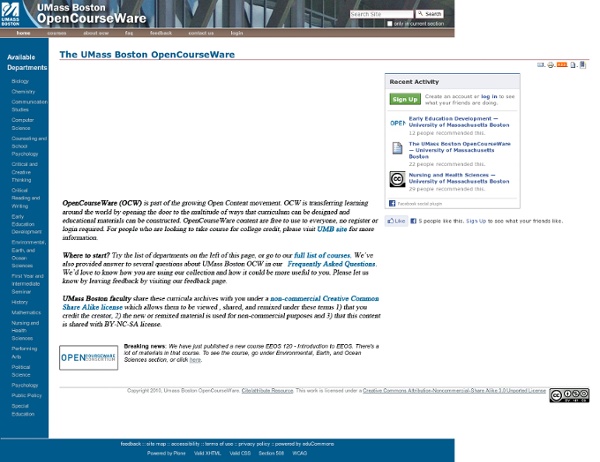



MIT World UC Irvine, OpenCourseWare Water is the economic, social, and physical lifeblood of humanity, providing the bases for agriculture, industry, transportation, energy production, and life itself. Despite its importance, alarming signs suggest that there are looming threats to this vital resource. The World Resources Institute contends that the world's thirst for water is likely to become one of the most pressing issues this century due to population growth, drought, and climate change. The World Bank reports that many developing nations already face a crisis from intensive irrigation, urbanization, diminishing supplies, and deteriorating infrastructure; and, UNESCO predicts as many as 7 billion people in half the world’s countries will face shortages of potable water by 2050. The purpose of this course is to illuminate how water is a political, social, economic, and environmental challenge and to suggest ways we might manage it better and more equitably.
Colleges and Universities that Offer Free Courses Online See our list of the top schools offering free courses online. Learn about what types of courses are available to find the school and courses that are right for you. Online Courses for Credit Plenty of free resources are available online for students who want to learn a new topic, but these free options don't generally lead to college credit. Students who want to earn college credit might want to look for online options that charge a small fee in exchange for access to online lessons. These fee-based courses can help students earn alternative forms of college credit. Education Portal offers this style of distance learning with quick, engaging video lessons and self-assessment quizzes. Free Online Non-Credited Courses Students who want to use the free university resources can go to the school's link, scroll through the list of available courses and lectures and view or download the available content. Carnegie Mellon University at CMU Open Learning Initiative Yale University at Open Yale
Stanford School of Engineering - Stanford Engineering Everywhere 100 Free Online Ivy League Courses By Alisa Miller Even those without top notch grades can now go to Ivy League schools. With the the availability of open courseware classes coming out of some of the finest schools in America, the range of subjects is astounding. If you have ever wondered about the beginnings of Hip Hop, wanted to learn a new language, would like to create a film for social change, or are interested in learning about robotics while playing with Legos, then these courses are right up your alley. Health and Nutrition From an aging population to autism to creating chemistry in the kitchen, these < ahref=" courses provide interesting perspectives on health and nutrition issues. Health Across the Lifespan: Frameworks, Contexts, and Measurements. Fine Arts From the art of color to theater to music, these courses will expand your knowledge while learning something fun. Composing Your Life: Exploration of Self Through Visual Arts and Writing. Child Development and Psychology
Virtual Professors Backdoor Broadcasting Company Khan Academy